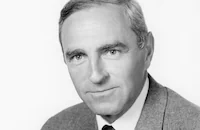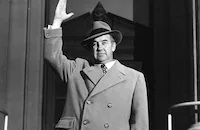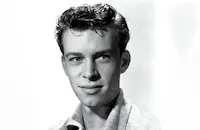Between Heaven and Hell
Brief Synopsis
Cast & Crew
Richard Fleischer
Robert Wagner
Terry Moore
Broderick Crawford
Buddy Ebsen
Robert Keith
Film Details
Technical Specs

Synopsis
In 1945, on an island in the Pacific, Sam Francis Gifford is busted from sergeant to private and reprimanded by Col. Miles for assaulting an officer under combat conditions. Rather than send Sam to Leavenworth prison, the colonel sentences him to George Company, a remote backwater camp in the hills. He is driven there by Willie Crawford, a philosophical sharecropper, who avers that Leavenworth is preferable to George Company. Upon arriving, Sam is harassed by Capt. Waco, the sadistic, brutish commander, and his two beefy bodyguards, Millard and Swanson. After his brush with Waco, Sam pulls a photo of his wife Jenny from his pocket and gazes longingly at it. When Millard, a psychopathic bully, makes lewd comments about the photo, Waco pulls it from Sam's hands and sets it on fire. Later, Joe Johnson, a lieutenant in the company, wonders aloud when the inspector general will finally realize that Waco is unfit for duty. When Joe asks Sam if he ever met Col. Gozzens, Sam replies that the colonel was his father-in-law. The mention of the colonel's name causes Sam to reflect on a happier time before the war: Sam, a wealthy Southern landowner, frolics with Jenny, his new wife. When Jenny asks to join Sam as he makes his rounds among the sharecroppers, she is appalled by his callous attitude. When Sam chides Kenny, one of the sharecroppers, for failing to pick enough cotton and orders the Raker family to work on Sunday, Jenny protests, but Sam arrogantly asserts that the croppers must be kept in their place. Soon after, Col. Gozzens notifies Sam that their National Guard unit has been called up for action in the Pacific. On their voyage overseas, Gozzens confides in Sam that many will die, and once the war ends, things will be different in the New South. As they put ashore, they are baptized by a hail of gunfire initiating from the cliffs above. Sam leads Kenny, Raker and Chicago-bred Bernard Meleski to the top of the hill and tosses a grenade into the machine gun nest. The resultant carnage sets Sam's hands shaking. Back at camp, Lt. Ray Mosby, a gentleman land owner, questions Sam's familiarity with his former sharecroppers. The colonel then calls Sam into his office and informs him that he has recommended him for the Silver Star. Soon after, the colonel is killed by a sniper's bullet, sending Sam into a tremulous fit. Ray, now power mad and slightly paranoid, assumes command and orders Sam and his men to search a deserted village. When part of a dilapidated house collapses in a crash, Ray, startled, opens fire and guns down Raker, Kenny and Bernie. In a rage, Sam slugs Ray and is later court-martialed. After ending his reverie, Sam is ordered by Waco to lead a patrol into a Japanese-held village. In the jungle, they pass a Japanese mortar squad and finally arrive at the village, which is now deserted. When Sam reports back to Waco, Waco accuses him of lying about completing his mission and disregards his warning about the mortar squad. As Sam throws down a placard from the village church as proof, the mortar squad opens fire on the camp, killing Millard and many others. The attack sends Sam into another fit and causes Waco, shaken by Millard's loss, to break down in tears. Afterward, Joe, Sam, Willie, Terry and several others are sent to relieve a surveillance squad perched high in the hills, overlooking the river. That night Willie observes that Sam seems "beat." Sam replies that losing three real friends in battle has made him that way. The next day, the radio goes dead and Sam and Terry return to camp to procure a new battery. There they learn that Col. Miles has relieved Waco from duty because of his erratic behavior. Waco, demented and rambling, climbs into the jeep to leave camp and is gunned down by a sniper. On the trek back to the hill outpost, Terry spots a booby-trapped Japanese sword on the jungle floor and reaches for it, triggering an explosion that kills him. Soon after Sam reaches the post, the Japanese attack, slaying all but Sam and Willie. As dawn breaks, Sam, still shaken, vows that his sharecroppers will be better off after the war and offers Willie a job. Sam's change of heart causes his shaking to stop. A wounded Japanese soldier then tosses a grenade into the foxhole, injuring Willie's leg. As Sam bandages the leg, he spots a Japanese flotilla on the river. Willie then urges him to escape before they are cut off, and Sam runs to warn the battalion below, dodging bullets along the way. Wounded, Sam stumbles into camp and pleads with Miles to rescue Willie. Soon after, Sam, now bandaged and ready to be sent home, refuses to leave without his friend Willie. Just then, Willie is brought down from the hills and his stretcher placed next to Sam's for their journey home.

Director

Richard Fleischer
Cast

Robert Wagner

Terry Moore

Broderick Crawford

Buddy Ebsen

Robert Keith

Brad Dexter
Mark Damon
Ken Clark

Harvey Lembeck

Skip Homeier
L. Q. Jones
Tod Andrews
Biff Elliot
Bart Burns
Frank Gerstle

Carl Switzer
Gregg Martell
Frank Gorshin
Darlene Fields
Ilene Brown
Scotty Morrow
Pixie Parkhurst
Brad Morrow

Scat Man Crothers
Sam Edwards
William Gallant
Boyd Red Morgan
Tom Pittman
Bill Stevens
Donald Covert
Dick Walsh
Ray Montgomery
Rollin Moriyama
Crew
Don Anderson
Harry Brown
James B. Clark
Leonard Doss
Hugo Friedhofer
Eugene Grossman
Addison Hehr
Stanley Hough
Ray Kellogg
Charles Lemaire
Harry M. Leonard
Lionel Newman
Ben Nye
Lt. Col. Gust E. Olson Usa
Edward B. Powell
Walter M. Scott
Leo Tover
Helen Turpin
Charles Vassar
David Weisbart
Lyle Wheeler

Film Details
Technical Specs

Award Nominations
Best Music, Original or Comedy Series
Articles
Frank Gorshin (1933-2005)
He was born on April 5, 1933, in Pittsburgh, Pennsylvania into a family of modest means, his father was a railroad worker and mother a homemaker. His childhood impressions of Edward G. Robinson and James Cagney paid off when he won a local talent contest at 17, and that led to his first gig at 17 at a the prize was a one week engagement at Jackie Heller's Carousel night club, Pittsburgh's hottest downtown spot in the day. The taste was there, and after high school Frank enrolled in the Carnegie-Mellon Tech School of Drama did hone his craft.
His career was interrupted briefly when he entered the US Army in 1953. He spent two years in Special Services as an entertainer. Once he got out, Frank tried his luck in Hollywood. He made his film debut in a forgettable William Holden vehicle The Proud and Profane, but his fortunes picked up soon when he and when he hooked up with American Internation Pictures (AIP). With his charasmatic sneer and cocky bravado that belied his slender, 5' 7" frame, Frank made a great punk villian in a series of entertaining "drive-in" fare: Hot Rod Girl (1956), Dragstrip Girl, Invasion of the Saucer Men, and of course the classic Portland Expose (all 1957).
By the '60s, he graduated to supporting roles in bigger Hollywood fare: Where the Boys Are, Bells Are Ringing (both 1960), Ring of Fire, and his biggest tole to date, that of Iggy the bank robber in Disney's hugely popular That Darn Cat (1965). Better still, Frank found some parts on television: Naked City, Combat!, The Untouchables, and this would be the medium where he found his greatest success. Little did he realize that when his skeletal physique donned those green nylon tights and cackled his high pitch laugh that Frank Gorshin would be forever identified as "the Riddler," one of Batman's main nemisis. For two years (1966-68), he was a semi-regular on the show and it brought him deserved national attention.
By the '70s, Frank made his Broadway debut, as the star of Jimmy, a musical based on the life of former New York City Mayor Jimmy Walker. He spent the next two decades alternating between the stage, where he appeared regularly in national touring productions of such popular shows as: Promises, Promises, Prisoner of Second Street, and Guys and Dolls; and nightclub work in Los Angeles and Las Vegas.
He recently found himself in demand for character roles on televison: Murder, She Wrote, Lois & Clark: The New Adventures of Superman and film: Terry Gilliam's Twelve Monkeys (1995), and the quirky comedy Man of the Century (1999). Yet his biggest triumph was his two year stint (2002-2004) as George Burns in the Broadway smash, Say Goodnight Gracie. It ran for 364 performances and he received critical raves from even the toughest New York theater critics, proving undoubtly that he was a performer for all mediums. He is survived by his wife Christina; a son, Mitchell; grandson Brandon and sister Dottie.
by Michael T. Toole

Frank Gorshin (1933-2005)
Quotes
Trivia
Notes
The working title of this film was The Day the Century Ended. Pre-production news items in Hollywood Reporter yield the following information about the picture: Guy Madison was originally considered for the part of "Sam" and Joan Collins was considered for the role of "Jenny." John Sturges was initially to direct. James Poe was working on a version of the script in February 1956, but the extent of his contribution to the released film has not been determined.
The Variety review incorrectly credits Tom Edwards rather than Sam Edwards in the role of "Soames." Studio production notes in the AMPAS file on the film note that the scene in which Sam and the others land on the beach was filmed in the Hawaiian Islands, but the rest of the picture was shot at the Twentieth Century-Fox ranch in the Santa Monica Mountains. The film was nominated for an Academy Award in the Music (Music Score of a Dramatic or Comedy Picture) category.

Miscellaneous Notes
Released in United States Fall October 1956
Released in United States on Video November 21, 1991
CinemaScope
Released in United States Fall October 1956
Released in United States on Video November 21, 1991













